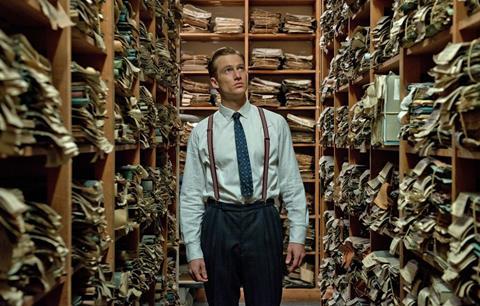Making a film about how Germany dealt with the aftermath of the Holocaust was an educational journey for Labyrinth Of Lies director Giulio Ricciarelli, as he tells Jeremy Kay.

Like many of those who grew up in Germany in the 1970s, Giulio Ricciarelli was well educated in the events of the Second World War, the Nazi party and the Holocaust.
But when he started developing his debut feature, Labyrinth Of Lies, about an idealistic lawyer in 1960s Germany trying to bring to trial a man he suspects of being a guard at Auschwitz, Ricciarelli was stunned to discover the extent of the denial into which a traumatised German population fell right after the war.
“Germany tried to sweep everything under the rug, and did everything to not talk about it for about 20 years,” explains the German director.
Sabine Lamby, his producing partner at Munich-based naked eye film production, had been developing a script with writer Elisabeth Bartel based on the real-life Frankfurt Auschwitz trials.
The drama focused on a young lawyer who becomes obsessed with his quest to prosecute a man he suspects of being a Nazi and in the process discovers the horrors of the Holocaust for the first time.
Lamby brought Ricciarelli on to the project as co-writer and they teamed up with Claussen+Wöbke+Putz Filmproduktion to co-produce what would become Ricciarelli’s directorial debut.
“We made the backbone of the film the emotional journey of a fictional young prosecutor called Johann Radmann,” says Ricciarelli.
“We took liberties, but there are aspects to his character that are based on real people.”
Radmann is a mélange of the three actual prosecutors, one of whom, the 87 year old Gerhard Wiese, became a friend of the production.
“He told me when, as a young prosecutor, he was assigned to the Auschwitz trial in 1962 he had no idea what had happened there,” Ricciarelli explains.
“There were people [in Germany] who knew and people who should have known. There’s this line in the film, ‘All we had to do was open our eyes.’”
Alexander Fehling, who plays Radmann, says Ricciarelli kept the atmosphere light during the 10-week shoot, although inevitably emotions ran high.
“I was overwhelmed by the research,” admits Fehling, who listened to audio files from the hearings before and after filming each day.
“But I knew I could use this. Sometimes it was exhausting because this character was burning from the inside. On the other hand it was pretty fulfilling, and you go home and you feel alive.”
Rather than dramatise the testimonies, Ricciarelli used a silent montage of camp survivors who gave evidence at the trials.
“We made a decision to not use flashbacks, real footage or direct testimony,” he explains. “We only show the faces of the survivors, we hear no words and the audience in that moment project all the iconic images and stories they know in their heart on the screen.
“We made a film about how Germany dealt with the Holocaust, not about the Holocaust itself,” he explains.
“But to capture the importance of the trial, we needed the horrors of the Holocaust in the film. From the first time I was confronted with Auschwitz as a young boy, I’ve found it very hard to comprehend how humans can do this to each other.”

























No comments yet